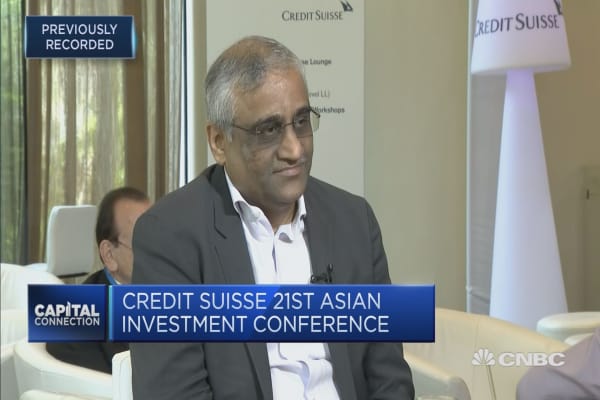The cost of doing business has to come down before e-commerce companies can succeed in India in the long run, according to the chief executive of a large retail group in the country.
Food and grocery businesses still find it difficult to move online while consumer durable, electronics and technology sellers have made the shift more notably, Kishore Biyani, founder and group CEO at Future Group, said. He added that fashion was only just beginning to shift online.
"But the cost of doing e-commerce in India probably is the highest in the whole world," he told CNBC at the Credit Suisse Asian Investment Conference in Hong Kong.
"The cost of acquiring a customer, the cost of fulfillment, the cash on delivery, the returns which they get — it's ultimately going to be the cost of doing business, it has to come down for the e-commerce business to succeed in the long term," he said.
Future Group owns a number of retail brands in India, including the retail chain Big Bazaar.
Biyani added that the Indian retail space was seeing a new strategy of online-to-offline, and offline-to-online, emerge.
Basically, some companies are trying to provide a seamless way for customers to shop online and then pick up the products at their brick-and-mortar stores. Conversely, many physical stores are also building online platforms for their consumers to shop.
As a result, he said, aligning with a large player could create "a very interesting model of acquiring customers" at a significantly lower cost. Still, Biyani clarified, Future Group is not currently in talks to team up with anyone.
India's e-commerce space is seeing a massive rivalry brewing between Amazon and local firm Flipkart, with spillover effects in the physical retail space.
For example, last year Amazon bought a stake in Indian departmental store Shoppers Stop — and news site Mint reported that the e-commerce giant planned to use that partnership to set up experience centers to show potential customers its brands, mostly in fashion and accessories.
While Jeff Bezos' company has aggressively invested in the Indian market, Flipkart could soon bolster its presence with the backing of another U.S. retail giant — Walmart. Last week, reports said the Arkansas-based company was in advanced talks to become the largest shareholder in Flipkart.
Meanwhile, in February, reports said that one of the country's leading online grocers — BigBasket — raised $300 million in a funding roundled by Chinese tech giant Alibaba.
Indians are consuming more than ever
According to Biyani, every new generation of Indians has consumed more than its predecessors. He added that there was also growing aspiration among consumers, likely due to the increased exposure and large volumes of media content they were were consuming.
"We believe Indians are going to consume much, much more than what they had been consuming," he said.
Biyani pointed to fashion trends as an example; he explained that, in the past, Indians bought new clothes about two or three times a year. Today, he said, they're buying about seven to eight times in 12 months. In the fast-moving consumer goods space, he added, new products and categories were constantly emerging.
"I believe this will ultimately drive the GDP growth — more consumption, more development, more job creation, more manufacturing, more GDP growth," he said.
Ultimately, Biyani said, he believed there would be a convergence between online platforms and brick-and-mortar stores in the next four to six years. The consumer, he said, would not notice the difference between a physical and an online store and would have the option to shop in either.

No comments:
Post a Comment